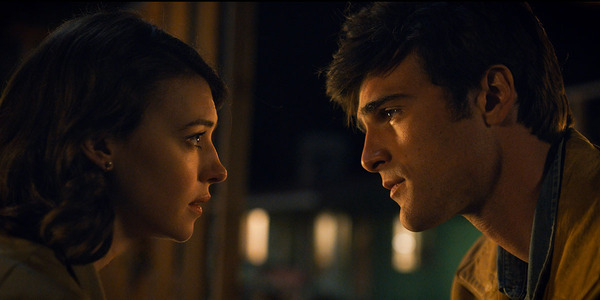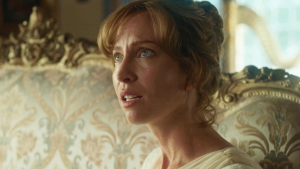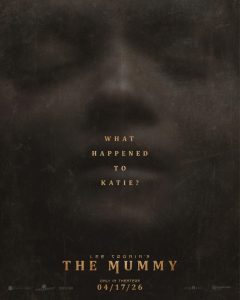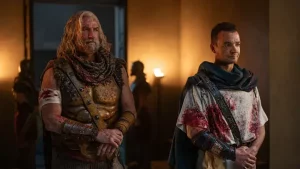
Sometimes, despite the best of intentions, a film just doesn’t come together in a way that fully realizes its creative potential. This is certainly true of Without Blood, and to a lesser extent, On Swift Horses. Both films yearn to be more than what they actually are, but alas, gets stranded in a middle ground of mediocrity.
On Swift Horses (Daniel Minahan)
On Swift Horses (2024) – source: Toronto International Film Festival
Crafting a narrative with restrained melancholy, Daniel Minahan tries his best to create an emotionally intelligent film with On Swift Horses. There’s certainly hints of quality filmmaking here, with strong performances and cinematography that help bolster its qualifications. The result isn’t a complete disappointment, but fails to shine in a way that it likely intended to.
Based on Shannon Pufahl’s novel of the same name, the film follows Muriel (Daisy Edgar-Jones) and Lee (Will Poulter), newlyweds living in the outskirts of Kansas. Their lives are intertwined with Lee’s brother, Julias (Jacob Elordi), who returns from the Korean War with a new outlook on life. While Julias travels to Las Vegas to test his luck, Muriel and Lee settle in San Diego for a more domesticated life. Diego Calva and Sasha Calle round out this impressive ensemble of performers.
At the outset, On Swift Horses eases into the complex lives of Muriel, Lee and Julias with affectionate fervour. Through scenes of intimacy and unexpected conversations, the film establishes a canvas brimming with intricacy. Luc Montpellier’s lush cinematography also creates a sense of wondrous possibilities, which serves as a contradiction to the restrictive societal views presented in the narrative itself. Performances from Edgar-Jones, Elordi and Poulter feel earnest, and become increasingly nuanced as the story progresses.
It’s clear that Minahan aimed to capitalize on the film’s goodwill of quality elements, and many sequences are undoubtedly impressive. As a whole, however, the moving parts just fail to transform into the cohesive force of nature it sets out to be. This is particularly apparent in the film’s third act, when the story finally reaches its emotional peak, only to feel heavy handed, rather than cathartic. Any restraint and delicate pacing employed by Minahan gets slowly thrown out the window in favour of tying up narrative loose ends.
And while the journey itself is often as important as the destination, On Swift Horses is simply one of those films where the ultimately destination is paramount to the story itself. Minahan isn’t able to latch onto the proverbial horse that leads him to the finish line, but should still be lauded for a valiant effort nonetheless. Edgar-Jones is (finally) achieving commercial success following this summer’s Twisters, but it’s always nice seeing her return to her softer dramatic roots. Along with the growing star power of Elordi, the film will likely still garner a good deal of interest, even if the product itself does end up missing its mark.
Without Blood (Angelina Jolie)
Without Blood (2024) – source: Toronto International FilmFestival
There’s a scene in Angelina Jolie’s latest directorial effort where characters played by Salma Hayek Pinault and Demián Bichir are dining in a restaurant, and almost out of the blue, dessert is served without any semblance of time being passed. This scene perfectly encapsulates the confounding creative exercise that is Without Blood; a film that simply passes by, with far too little to show for. It’s well intentioned, particularly given the source material, but fails to leave a memorable mark on its viewers.
Deliberately avoiding any mention of a specific geographical location, Without Blood adapts Alessandro Baricco’s novel about the pillaging effects of war. Following a vengeful act where a young girls’ family is slaughtered in cold blood, the film takes a time jump and follows Nina (Hayek Pinault), as she walks aimlessly to a lottery stand. There, she meets Tito (Bichir), and their shared past comes to light through this unlikely chance encounter.
What’s clear is that Jolie can be a patient filmmaker, and after the violent encounter that kicks off the story, Without Blood takes a backseat in order to observe the unbearable weight of Nina and Tito’s shared conversation. Splicing between flashbacks, there’s an emphasis on how one’s traumatic memories form a complex relationship with the traumatized, and live on in a forceful way. Hayek Pinault and Bichir don’t necessarily have a lot of room to shine, but find ways of demonstrating their emotional range in what ends up being dialogue heavy exposition.
The problem is, much of the dialogue and expository flashbacks fail to bring the narrative away from its rather stagnant position of complacency. It’s clear that Jolie is opting to present a rather neutral stance on the trickling (and inter-generational) effects of war, but the neutrality unfortunately also embeds itself into the film’s creative choices. Time simply passes, with little conviction when it comes to true creative ingenuity. The lack of ingenuity creates an experience that feels stuck in the mud, rather than becoming truly vested in the emotional core of Nina and Tito’s deep conversation.
Jolie should be recognized for bringing a story of such relevancy and importance to the big screen, but good and valiant intentions don’t always result in quality filmmaking. Her directorial efforts in the past have certainly shown promise, but Without Blood simply falters as a piece of convincing storytelling.
Does content like this matter to you?
Become a Member and support film journalism. Unlock access to all of Film Inquiry`s great articles. Join a community of like-minded readers who are passionate about cinema – get access to our private members Network, give back to independent filmmakers, and more.












